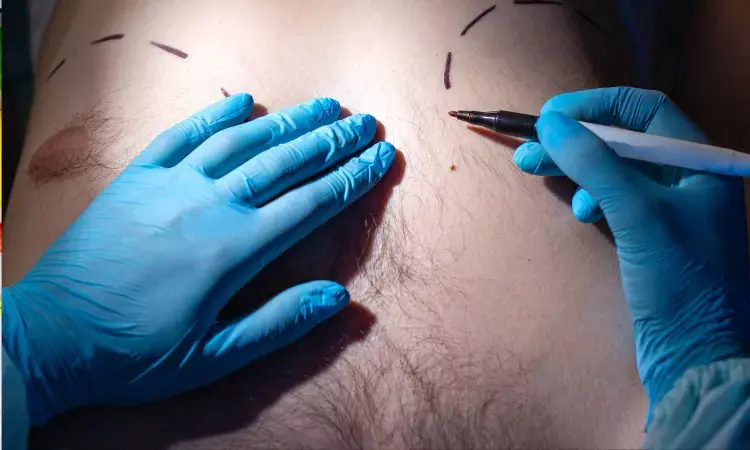- Home
- Medical news & Guidelines
- Anesthesiology
- Cardiology and CTVS
- Critical Care
- Dentistry
- Dermatology
- Diabetes and Endocrinology
- ENT
- Gastroenterology
- Medicine
- Nephrology
- Neurology
- Obstretics-Gynaecology
- Oncology
- Ophthalmology
- Orthopaedics
- Pediatrics-Neonatology
- Psychiatry
- Pulmonology
- Radiology
- Surgery
- Urology
- Laboratory Medicine
- Diet
- Nursing
- Paramedical
- Physiotherapy
- Health news
- Fact Check
- Bone Health Fact Check
- Brain Health Fact Check
- Cancer Related Fact Check
- Child Care Fact Check
- Dental and oral health fact check
- Diabetes and metabolic health fact check
- Diet and Nutrition Fact Check
- Eye and ENT Care Fact Check
- Fitness fact check
- Gut health fact check
- Heart health fact check
- Kidney health fact check
- Medical education fact check
- Men's health fact check
- Respiratory fact check
- Skin and hair care fact check
- Vaccine and Immunization fact check
- Women's health fact check
- AYUSH
- State News
- Andaman and Nicobar Islands
- Andhra Pradesh
- Arunachal Pradesh
- Assam
- Bihar
- Chandigarh
- Chattisgarh
- Dadra and Nagar Haveli
- Daman and Diu
- Delhi
- Goa
- Gujarat
- Haryana
- Himachal Pradesh
- Jammu & Kashmir
- Jharkhand
- Karnataka
- Kerala
- Ladakh
- Lakshadweep
- Madhya Pradesh
- Maharashtra
- Manipur
- Meghalaya
- Mizoram
- Nagaland
- Odisha
- Puducherry
- Punjab
- Rajasthan
- Sikkim
- Tamil Nadu
- Telangana
- Tripura
- Uttar Pradesh
- Uttrakhand
- West Bengal
- Medical Education
- Industry
Idiopathic Gynecomastia significant predictor of future disease

Denmark: According to a study published in The Journal of Clinical Endocrinology & Metabolism, idiopathic Gynecomastia is a clinical symptom of underlying disease in men. It predicts the risk of future disease; hence, more awareness is required to identify its cause in males.
Gynecomastia affects 32%-65% of men and is likely to increase due to obesity. None of the studies has been associated it with the risk of disease in males. There needs to be more data on the relationship between Gynecomastia and general health in males.
Researchers assessed health before and after the diagnosis of Gynecomastia.
The study summary includes the following:
- Among 140,574 males, 23,429 had incident gynecomastia, and 117,145 were without Gynecomastia.
- Males with a history of Gynecomastia were stratified idiopathic or with a known pre-existing risk factor.
- 69.4 % of males had idiopathic Gynecomastia. These had a statistically significant higher risk of future disease across all included disease chapters having an HR range of 1.19 to 1.89.
- The endocrine diseases having HR 1.89 had the highest disease risk. The endocrine gland disorders, obesity and other conditions had HR of 7.27, 2.33 and 1.03 to 1.54 respectively.
- The highest sub-chapter disease risk for disorders of endocrine glands had an OR of 7.27.
- There was an increased risk of comorbidities before a diagnosis of idiopathic Gynecomastia. The OR for musculoskeletal/connective tissue and circulatory diseases was 1.51 and 1.36, respectively.
- Prior comorbidities with Gynecomastia and a known risk factor for endocrine disorders, circulatory and Psychiatric disorders had OR 4.04, 3.48 and 4.18
To conclude, idiopathic Gynecomastia is a symptom of disease in males. It represents the future disease risk of an individual, so it is essential to determine the cause of it, and there should be more awareness among healthcare providers in this context.
The study’s limitations were associations cannot prove causation, Possible misclassifications, pseudo-gynecomastia, etc.
Further reading:
Uldbjerg CS, Lim YH, Bräuner EV, Juul A. Increased Morbidity in Males Diagnosed with Gynecomastia: A nationwide register-based cohort study. J Clin Endocrinol Metab. 2023 Jan 31:dgad048. doi: 10.1210/clinem/dgad048.
BDS, MDS in Periodontics and Implantology
Dr. Aditi Yadav is a BDS, MDS in Periodontics and Implantology. She has a clinical experience of 5 years as a laser dental surgeon. She also has a Diploma in clinical research and pharmacovigilance and is a Certified data scientist. She is currently working as a content developer in e-health services. Dr. Yadav has a keen interest in Medical Journalism and is actively involved in Medical Research writing.
Dr Kamal Kant Kohli-MBBS, DTCD- a chest specialist with more than 30 years of practice and a flair for writing clinical articles, Dr Kamal Kant Kohli joined Medical Dialogues as a Chief Editor of Medical News. Besides writing articles, as an editor, he proofreads and verifies all the medical content published on Medical Dialogues including those coming from journals, studies,medical conferences,guidelines etc. Email: drkohli@medicaldialogues.in. Contact no. 011-43720751


